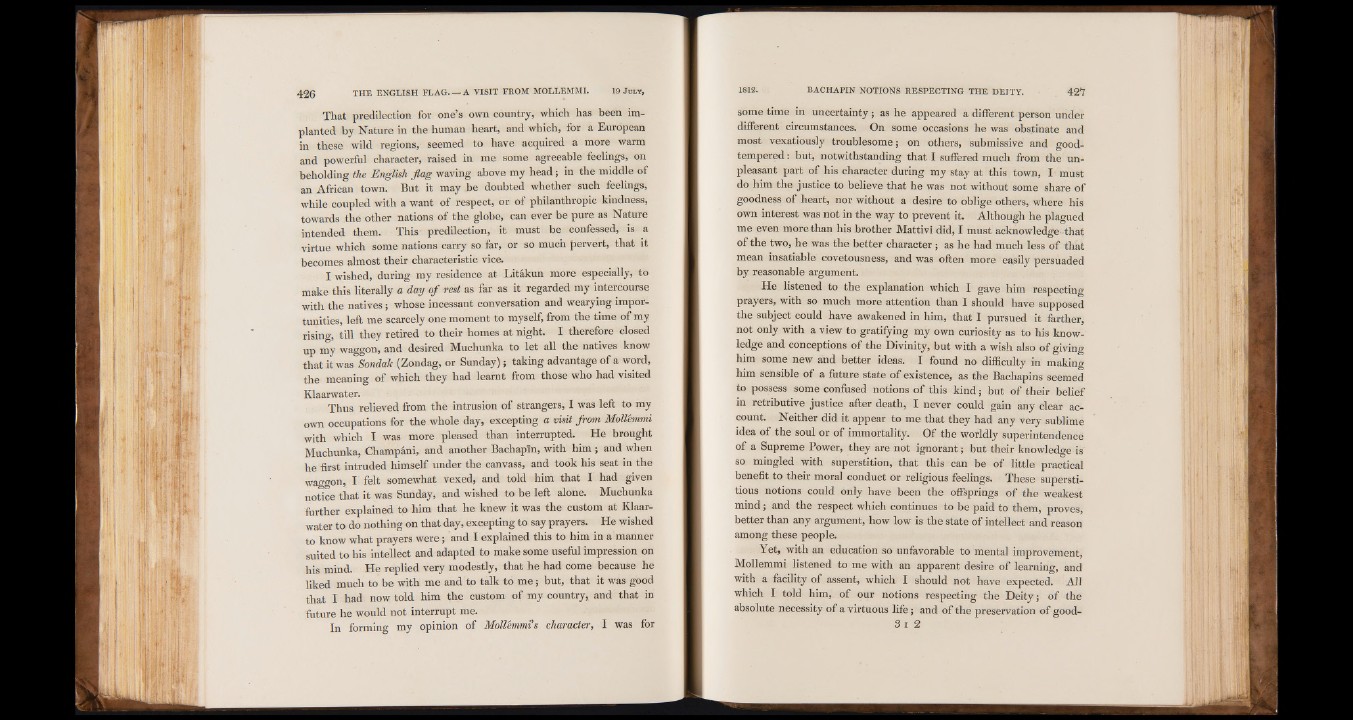
That predilection for one’s own country, which has been implanted
by Nature in the human heart, and which, for a European
in these wild regions, seemed to have acquired a more warm
and powerful character, raised in me some agreeable feelings, on
beholding the English flag waving above my head; in the middle of
an African town. But it may be doubted whether such feelings,
while coupled with a want of respect, or of philanthropic kindness,
towards the other nations of the globe, can ever be pure as Nature
intended them. This predilection, it must be confessed, is a
virtue which some nations carry so far, or so much pervert, that it
becomes almost their characteristic vice.
I wished, during my residence at Litakun more especially, to
make this literally a day of rest as far as it regarded my intercourse
with the natives; whose incessant conversation and wearying importunities,
left me scarcely one moment to myself, from the time of my
rising, till they retired to their homes at night. I therefore closed
up my waggon, and desired Muchunka to let all the natives know
that it was Sondak (Zondag, or Sunday) ; taking advantage of a word,
the meaning of which they had learnt from those who had visited
Klaarwaler.
Thus relieved from the intrusion of strangers, I was left to my
own occupations for the whole day, excepting a visit from. Mollemmi
with which I was more pleased than interrupted. He brought
Muchunka, Champani, and another BachapTn, with him j and when
he first intruded himself under the canvass, and took his seat in the
waggon, I felt somewhat vexed, and told him that I had given
notice that it was Sunday, and wished to be left alone. Muchunka
further explained to him that he knew it was the custom at Klaar-
water to do nothing on that day, excepting to say prayers. He wished
to know what prayers were; and I explained this to him in a manner
suited to his intellect and adapted to make some useful impression on
his mind. He replied very modestly, that he had come because he
liked much to be with me and to talk to me ; but, that it was good
that I had now told him the custom of my country, and that in
future he would not interrupt me.
In forming my opinion of Mollemmi’s character, I was for
sometime in uncertainty; as he appeared a different person under
different circumstances. On some occasions he was obstinate and
most vexatiously troublesome; on others, submissive and good-
tempered : but, notwithstanding that I suffered much from the unpleasant
part of his character during my stay at this town, I must
do him the justice to believe that he was not without some share of
goodness of heart, nor without a desire to oblige others, where his
own interest was not in the way to prevent it. Although he plagued
me even more than his brother Mattivi did, I must acknowledge- that
of the two, he was the better character ; as he had much less of that
mean insatiable covetousness, and was often more easily persuaded
by reasonable argument.
He listened to the explanation which I gave him respecting
prayers, with so much more attention than I should have supposed
the subject could have awakened in him, that I pursued it farther,
not only with a view to gratifying my own curiosity as to his knowledge
and conceptions of the Divinity, but with a wish also of giving
him some new and better ideas. I found no difficulty in making
him sensible of a future state of existence, as the Bachapins seemed
to possess some confused notions of this kind; but of their belief
in retributive justice after death, I never could gain any clear account.
Neither did it appear to me that they had any very sublime
idea of the soul or of immortality. Of the worldly superintendence
of a Supreme Power, they are not ignorant; but their knowledge is
so mingled with superstition, that this can be of little practical
benefit to their moral conduct or religious feelings. These superstitious
notions could only have been the offsprings of the weakest
mind; and the respect which continues to be paid to them, proves,
better than any argument, how low is the state of intellect and reason
among these people.
Yet, with an education so unfavorable to mental improvement,
Mollemmi listened to me with an apparent desire of learning, and
with a facility of assent, which I should not have expected. All
which I told him, of our notions respecting the Deity; of the
absolute necessity of a virtuous life; and of the preservation of good-
3 1 2